The Poison Belt (12)
By:
July 3, 2012
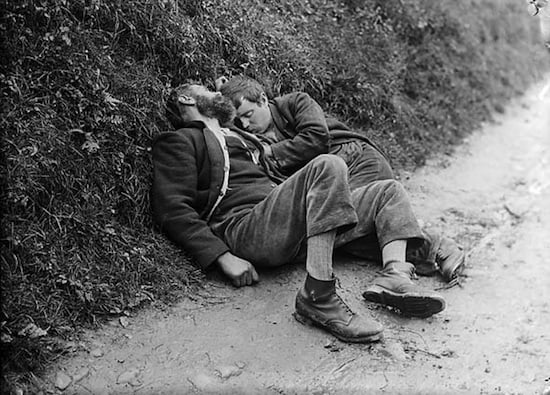
HILOBROW is pleased to present the twelfth and final installment of our serialization of Arthur Conan Doyle’s The Poison Belt.
If you alone had discovered that the Earth was about to be engulfed in a belt of poisonous “ether” from outer space, what would you do? Professor Challenger, a controversial scientist whose intellectual sprezzatura may remind you of Arthur Conan Doyle’s more famous fictional detective character, assembles the adventurers with whom he’d once romped through a South American jungle (in The Lost World, published in 1912) and locks them in his wife’s dressing room. Less a thriller than a brainteaser set against a catastrophic backdrop, in this 1913 sequel Challenger & Co. inquire into the method of the mind, and the relationship of intuition to reason, even as the world ends.
“To anyone who has had the delightful experience of traveling in The Lost World with Professor Challenger the bare announcement that that brilliant and eccentric personage plays a most important part in this new tale will quite suffice. For who, having once met the Professor, would not desire to continue the acquaintance?” — New York Times (1913).
“It’s impossible to read The Poison Belt, written in 1913, and not see in its exterminating vision a shadow of the coming war that would, only slightly less effectively, destroy Conan Doyle’s world.” — Gordon Dahlquist (2012 blurb for HiLoBooks)
In July, HiLoBooks will publish a beautiful new edition of The Poison Belt, with an introduction by Radium Age science fiction scholar (and HiLobrow editor) Joshua Glenn. Afterword by Gordon Dahlquist, author of The Glass Books of the Dream Eaters, The Dark Volume, and the forthcoming The Chemickal Marriage.
ALL EXCERPTS: 1 | 2 | 3 | 4 | 5 | 6 | 7 | 8 | 9 | 10 | 11 | 12
LAST WEEK: “Everybody was alive once more! Had it all been a delusion? Was it conceivable that this whole poison belt incident had been an elaborate dream? For an instant my startled brain was really ready to believe it.”
I rushed downstairs, but the hall door was open, and I heard the voices of my companions, loud in astonishment and congratulation, in the yard. How we all shook hands and laughed as we came together, and how Mrs. Challenger kissed us all in her emotion, before she finally threw herself into the bear-hug of her husband.
“But they could not have been asleep!” cried Lord John. “Dash it all, Challenger, you don’t mean to believe that those folk were asleep with their staring eyes and stiff limbs and that awful death grin on their faces!”
“It can only have been the condition that is called catalepsy,” said Challenger. “It has been a rare phenomenon in the past and has constantly been mistaken for death. While it endures, the temperature falls, the respiration disappears, the heartbeat is indistinguishable — in fact, it is death, save that it is evanescent. Even the most comprehensive mind”— here he closed his eyes and simpered —”could hardly conceive a universal outbreak of it in this fashion.”
“You may label it catalepsy,” remarked Summerlee, “but, after all, that is only a name, and we know as little of the result as we do of the poison which has caused it. The most we can say is that the vitiated ether has produced a temporary death.”
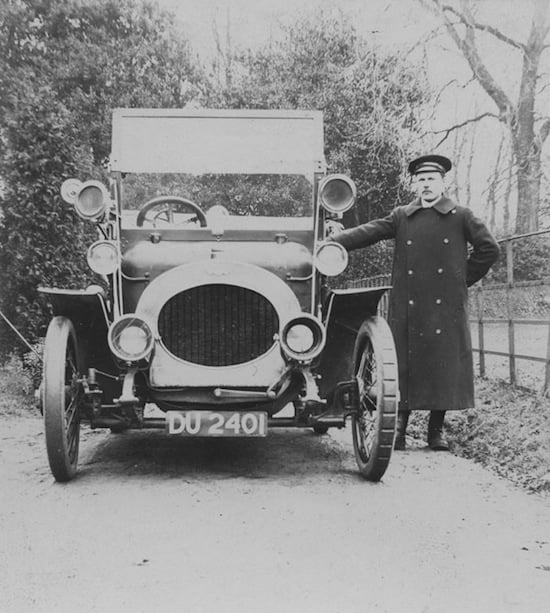
Austin was seated all in a heap on the step of the car. It was his coughing which I had heard from above. He had been holding his head in silence, but now he was muttering to himself and running his eyes over the car.
“Young fat-head!” he grumbled. “Can’t leave things alone!”
“What’s the matter, Austin?”
“Lubricators left running, sir. Someone has been fooling with the car. I expect it’s that young garden boy, sir.”
Lord John looked guilty.
“I don’t know what’s amiss with me,” continued Austin, staggering to his feet. “I expect I came over queer when I was hosing her down. I seem to remember flopping over by the step. But I’ll swear I never left those lubricator taps on.”
In a condensed narrative the astonished Austin was told what had happened to himself and the world. The mystery of the dripping lubricators was also explained to him. He listened with an air of deep distrust when told how an amateur had driven his car and with absorbed interest to the few sentences in which our experiences of the sleeping city were recorded. I can remember his comment when the story was concluded.
“Was you outside the Bank of England, sir?”
“Yes, Austin.”
“With all them millions inside and everybody asleep?”
“That was so.”
“And I not there!” he groaned, and turned dismally once more to the hosing of his car.
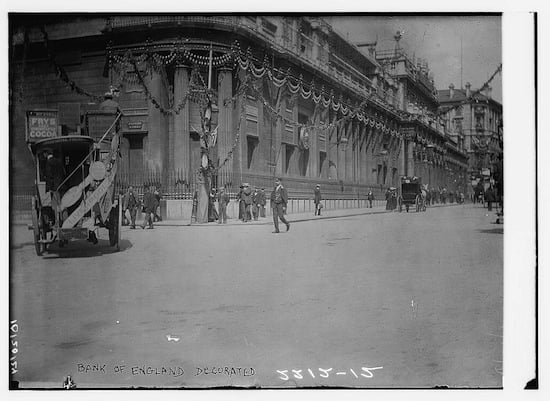
There was a sudden grinding of wheels upon gravel. The old cab had actually pulled up at Challenger’s door. I saw the young occupant step out from it. An instant later the maid, who looked as tousled and bewildered as if she had that instant been aroused from the deepest sleep, appeared with a card upon a tray. Challenger snorted ferociously as he looked at it, and his thick black hair seemed to bristle up in his wrath.
“A Pressman!” he growled. Then with a deprecating smile: “After all, it is natural that the whole world should hasten to know what I think of such an episode.”
“That can hardly be his errand,” said Summerlee, “for he was on the road in his cab before ever the crisis came.”
I looked at the card: “James Baxter, London Correspondent, New York Monitor.”
“You’ll see him?” said I.
“Not I.”
“Oh, George! You should be kinder and more considerate to others. Surely you have learned something from what we have undergone.”
He tut-tutted and shook his big, obstinate head.
“A poisonous breed! Eh, Malone? The worst weed in modern civilization, the ready tool of the quack and the hindrance of the self-respecting man! When did they ever say a good word for me?”
“When did you ever say a good word to them?” I answered. “Come, sir, this is a stranger who has made a journey to see you. I am sure that you won’t be rude to him.”
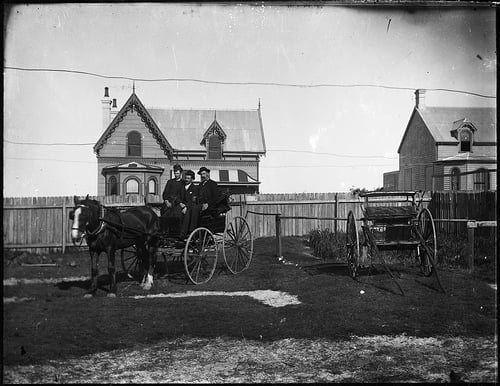
“Well, well,” he grumbled, “you come with me and do the talking. I protest in advance against any such outrageous invasion of my private life.” Muttering and mumbling, he came rolling after me like an angry and rather ill-conditioned mastiff.
The dapper young American pulled out his notebook and plunged instantly into his subject.
“I came down, sir,” said he, “because our people in America would very much like to hear more about this danger which is, in your opinion, pressing upon the world.”
“I know of no danger which is now pressing upon the world,” Challenger answered gruffly.
The Pressman looked at him in mild surprise.
“I meant, sir, the chances that the world might run into a belt of poisonous ether.”
“I do not now apprehend any such danger,” said Challenger.
The Pressman looked even more perplexed.
“You are Professor Challenger, are you not?” he asked.
“Yes, sir; that is my name.”
“I cannot understand, then, how you can say that there is no such danger. I am alluding to your own letter, published above your name in the London Times of this morning.”
It was Challenger’s turn to look surprised.
“This morning?” said he. “No London Times was published this morning.”
“Surely, sir,” said the American in mild remonstrance, “you must admit that the London Times is a daily paper.” He drew out a copy from his inside pocket. “Here is the letter to which I refer.”

Challenger chuckled and rubbed his hands.
“I begin to understand,” said he. “So you read this letter this morning?”
“Yes, sir.”
“And came at once to interview me?”
“Yes, sir.”
“Did you observe anything unusual upon the journey down?”
“Well, to tell the truth, your people seemed more lively and generally human than I have ever seen them. The baggage man set out to tell me a funny story, and that’s a new experience for me in this country.”
“Nothing else?”
“Why, no, sir, not that I can recall.”
“Well, now, what hour did you leave Victoria?”
The American smiled.
“I came here to interview you, Professor, but it seems to be a case of ‘Is this nigger fishing, or is this fish niggering?’ You’re doing most of the work.”
“It happens to interest me. Do you recall the hour?”
“Sure. It was half-past twelve.”
“And you arrived?”
“At a quarter-past two.”
“And you hired a cab?”
“That was so.”
“How far do you suppose it is to the station?”
“Well, I should reckon the best part of two miles.”
“So how long do you think it took you?”
“Well, half an hour, maybe, with that asthmatic in front.”
“So it should be three o’clock?”
“Yes, or a trifle after it.”
“Look at your watch.”
The American did so and then stared at us in astonishment.
“Say!” he cried. “It’s run down. That horse has broken every record, sure. The sun is pretty low, now that I come to look at it. Well, there’s something here I don’t understand.”
“Have you no remembrance of anything remarkable as you came up the hill?”
“Well, I seem to recollect that I was mighty sleepy once. It comes back to me that I wanted to say something to the driver and that I couldn’t make him heed me. I guess it was the heat, but I felt swimmy for a moment. That’s all.”
“So it is with the whole human race,” said Challenger to me. “They have all felt swimmy for a moment. None of them have as yet any comprehension of what has occurred. Each will go on with his interrupted job as Austin has snatched up his hose-pipe or the golfer continued his game. Your editor, Malone, will continue the issue of his papers, and very much amazed he will be at finding that an issue is missing. Yes, my young friend,” he added to the American reporter, with a sudden mood of amused geniality, “it may interest you to know that the world has swum through the poisonous current which swirls like the Gulf Stream through the ocean of ether. You will also kindly note for your own future convenience that to-day is not Friday, August the twenty-seventh, but Saturday, August the twenty-eighth, and that you sat senseless in your cab for twenty-eight hours upon the Rotherfield Hill.”
And “right here,” as my American colleague would say, I may bring this narrative to an end. It is, as you are probably aware, only a fuller and more detailed version of the account which appeared in the Monday edition of the Daily Gazette— an account which has been universally admitted to be the greatest journalistic scoop of all time, which sold no fewer than three-and-a-half million copies of the paper. Framed upon the wall of my sanctum I retain those magnificent headlines:—
UNPRECEDENTED EXPERIENCE
CHALLENGER JUSTIFIED
OUR CORRESPONDENT ESCAPES
ENTHRALLING NARRATIVE
THE OXYGEN ROOM
WEIRD MOTOR DRIVE
DEAD LONDON
REPLACING THE MISSING PAGE
GREAT FIRES AND LOSS OF LIFE
WILL IT RECUR?
Underneath this glorious scroll came nine and a half columns of narrative, in which appeared the first, last, and only account of the history of the planet, so far as one observer could draw it, during one long day of its existence. Challenger and Summerlee have treated the matter in a joint scientific paper, but to me alone was left the popular account. Surely I can sing “Nunc Dimittis.” What is left but anti-climax in the life of a journalist after that!
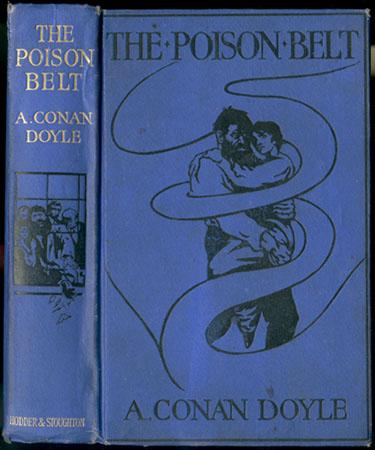
But let me not end on sensational headlines and a merely personal triumph. Rather let me quote the sonorous passages in which the greatest of daily papers ended its admirable leader upon the subject — a leader which might well be filed for reference by every thoughtful man.
“It has been a well-worn truism,” said the Times, “that our human race are a feeble folk before the infinite latent forces which surround us. From the prophets of old and from the philosophers of our own time the same message and warning have reached us. But, like all oft-repeated truths, it has in time lost something of its actuality and cogency. A lesson, an actual experience, was needed to bring it home. It is from that salutory but terrible ordeal that we have just emerged, with minds which are still stunned by the suddenness of the blow and with spirits which are chastened by the realization of our own limitations and impotence. The world has paid a fearful price for its schooling. Hardly yet have we learned the full tale of disaster, but the destruction by fire of New York, of Orleans, and of Brighton constitutes in itself one of the greatest tragedies in the history of our race. When the account of the railway and shipping accidents has been completed, it will furnish grim reading, although there is evidence to show that in the vast majority of cases the drivers of trains and engineers of steamers succeeded in shutting off their motive power before succumbing to the poison. But the material damage, enormous as it is both in life and in property, is not the consideration which will be uppermost in our minds to-day. All this may in time be forgotten. But what will not be forgotten, and what will and should continue to obsess our imaginations, is this revelation of the possibilities of the universe, this destruction of our ignorant self-complacency, and this demonstration of how narrow is the path of our material existence and what abysses may lie upon either side of it. Solemnity and humility are at the base of all our emotions to-day. May they be the foundations upon which a more earnest and reverent race may build a more worthy temple.”
RADIUM AGE SCIENCE FICTION: “Radium Age” is HILOBROW’s name for the 1904–33 era, which saw the discovery of radioactivity, the revelation that matter itself is constantly in movement — a fitting metaphor for the first decades of the 20th century, during which old scientific, religious, political, and social certainties were shattered. This era also saw the publication of genre-shattering writing by Edgar Rice Burroughs, Sax Rohmer, E.E. “Doc” Smith, Jack London, Arthur Conan Doyle, Aldous Huxley, Olaf Stapledon, Karel Čapek, H.P. Lovecraft, Charlotte Perkins Gilman, Yevgeny Zamyatin, Philip Gordon Wylie, and other pioneers of post-Verne/Wells, pre-Golden Age “science fiction.” More info here.
HILOBOOKS: The mission of HiLoBooks is to serialize novels on HiLobrow; and also, as of 2012, operating as an imprint of Richard Nash’s Cursor, to reissue Radium Age science fiction in beautiful new print editions. So far, we have published Jack London’s The Scarlet Plague, Rudyard Kipling’s With the Night Mail (and “As Easy as A.B.C.”), Arthur Conan Doyle’s The Poison Belt, H. Rider Haggard’s When the World Shook, Edward Shanks’s The People of the Ruins, William Hope Hodgson’s The Night Land, and J.D. Beresford’s Goslings. Forthcoming: E.V. Odle’s The Clockwork Man, Cicely Hamilton’s Theodore Savage, and Muriel Jaeger’s The Man with Six Senses. For more information, visit the HiLoBooks homepage.
READ: Jack London’s The Scarlet Plague, serialized between January and April 2012; and Rudyard Kipling’s With the Night Mail (and “As Easy as A.B.C.”), serialized between March and June 2012.
ORIGINAL FICTION: HILOBROW has serialized three novels: James Parker’s The Ballad of Cocky The Fox (“a proof-of-concept that serialization can work on the Internet” — The Atlantic) and Karinne Keithley Syers’s Linda Linda Linda. We also publish original stories and comics.
